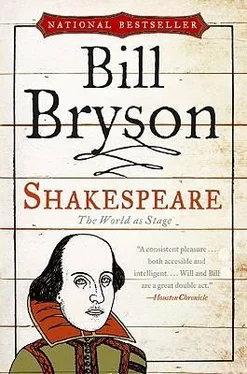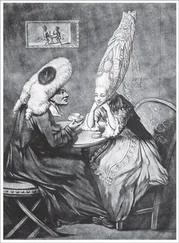Although Thomas knew he had the right page and had studied the document many times, it took him a good minute or more to find the line referring to “John Shappere alias Shakespere” of “ Stratford upon Haven,” accusing him of usury. The document is of considerable importance to Shakespeare scholars for it helps to explain why in 1576, when Will was twelve years old, his father abruptly retired from public life (about which more in due course), but it was only found in 1983 by a researcher named Wendy Goldsmith.
There are more than a hundred miles of records like this in the National Archives-nearly ten million documents altogether-in London and in an old salt mine in Cheshire, not all of them from the relevant period, to be sure, but enough to keep the most dedicated researcher busy for decades.
The only certain way to find more would be to look through all the documents. In the early 1900s an odd American couple, Charles and Hulda Wallace, decided to do just that. Charles Wallace was an instructor in English at the University of Nebraska who just after the turn of the century, for reasons unknown, developed a sudden and lasting fixation with determining the details of Shakespeare’s life. In 1906 he and Hulda made the first of several trips to London to sift through the records. Eventually they settled there permanently. Working for up to eighteen hours a day, mostly at the Public Record Office on Chancery Lane, as it then was, they pored over hundreds of thousands-Wallace claimed five million*-documents of all types: Exchequer memoranda rolls, property deeds, messuages, pipe rolls, plea rolls, conveyancings, and all the other dusty hoardings of legal life in sixteenth-and early seventeenth-century London.
Their conviction was that Shakespeare, as an active citizen, was bound to turn up in the public records from time to time. The theory was sound enough, but when you consider that there were hundreds of thousands of records, without indexes or cross-references, each potentially involving any of two hundred thousand citizens; that Shakespeare’s name, if it appeared at all, might be spelled in some eighty different ways, or be blotted or abbreviated beyond recognition; and that there was no reason to suppose that he had been involved in London in any of the things-arrest, marriage, legal disputes, and the like-that got one into the public records in the first place, the Wallaces’ devotion was truly extraordinary.
So we may imagine a muffled cry of joy when in 1909 they came across a litigation roll from the Court of Requests in London comprising twenty-six assorted documents that together make up what is known as the Belott-Mountjoy (or Mountjoie) Case. All relate to a dispute in 1612 between Christopher Mountjoy, a refugee Huguenot wigmaker, and his son-in-law, Stephen Belott, over a marriage settlement. Essentially Belott felt that his father-in-law had not given him all that he had promised, and so he took the older man to court.
Shakespeare, it appears, was caught up in the affair because he had been a lodger in Mountjoy’s house in Cripplegate in 1604 when the dispute arose. By the time he was called upon to give testimony eight years later, he claimed-not unreasonably-to be unable to remember anything of consequence about what had been agreed upon between his landlord and the landlord’s son-in-law.
The case provided no fewer than twenty-four new mentions of Shakespeare and one precious additional signature-the sixth and so far last one found. Moreover it is also the best and most natural of his surviving signatures. This was the one known occasion when Shakespeare had both space on the page for a normal autograph and a healthily steady hand with which to write it. Even so, as was his custom, he writes the name in an abbreviated form: “Wllm Shaksp.” It also has a large blot on the end of the surname, probably because of the comparatively low quality of the paper. Though it is only a deposition, it is also the only document in existence containing a transcript of Shakespeare speaking in his own voice.
The Wallaces’ find, reported the following year in the pages of the University of Nebraska Studies (and forever likely to remain, we may suppose, that journal’s greatest scoop), was important for two other reasons. It tells us where Shakespeare was living at an important point in his career: in a house on the corner of Silver and Monkswell streets near Saint Aldermanbury in the City of London. And the date of Shakespeare’s deposition, May 11, 1612, provides one of the remarkably few days in his life when we can say with complete certainty where he was.
The Belott-Mountjoy papers were only part of what the Wallaces found in their years of searching. It is from their work that we know the extent of Shakespeare’s financial interests in the Globe and Blackfriars theaters, and of his purchase of a gatehouse at Blackfriars in 1613, just three years before his death. They found a lawsuit in which the daughter of John Heminges, one of Shakespeare’s closest colleagues, sued her father over some family property in 1615. For Shakespeare scholars these are moments of monumental significance.
Unfortunately, as time passed Charles Wallace began to grow a little strange. He penned extravagant public tributes to himself in the third person (“Prior to his researches,” read one, “it was believed and taught for nearly 50 years that everything was known about Shakespeare that ever would be known. His remarkable discoveries have changed all this…and brought lasting honor to American scholarship”) and developed paranoid convictions. He became convinced that other researchers were bribing the desk clerks at the Public Record Office to learn which files he had ordered. Eventually he believed that the British government was secretly employing large numbers of students to uncover Shakespeare records before he could get to them, and claimed as much in an American literary magazine, causing dismay and unhappiness on both sides of the Atlantic.
Short of funds and increasingly disowned by the academic community, he and Hulda gave up on Shakespeare and the English, and moved back to the United States. It was the height of the oil boom in Texas, and Wallace developed another unexpected conviction: He decided that he could recognize good oil land just by looking at it. Following a secret instinct, he sank all his remaining funds in a 160-acre farm in Wichita Falls, Texas. It proved to be one of the most productive oil fields ever found anywhere. He died in 1932, immensely rich and not very happy.
With so little to go on in the way of hard facts, students of Shakespeare’s life are left with essentially three possibilities: to pick minutely over legal documents as the Wallaces did; to speculate (“every Shakespeare biography is 5 percent fact and 95 percent conjecture,” one Shakespeare scholar told me, possibly in jest); or to persuade themselves that they know more than they actually do. Even the most careful biographers sometimes take a supposition-that Shakespeare was Catholic or happily married or fond of the countryside or kindly disposed toward animals-and convert it within a page or two to something like a certainty. The urge to switch from subjunctive to indicative is, to paraphrase Alastair Fowler, always a powerful one.
Others have simply surrendered themselves to their imaginations. One respected and normally levelheaded academic of the 1930s, the University of London’s Caroline F. E. Spurgeon, became persuaded that it was possible to determine Shakespeare’s appearance from a careful reading of his text, and confidently announced (in Shakespeare’s Imagery and What It Tells Us) that he was “a compactly well-built man, probably on the slight side, extraordinarily well-coordinated, lithe and nimble of body, quick and accurate of eye, delighting in swift muscular movement. I suggest that he was probably fair-skinned and of a fresh colour, which in youth came and went easily, revealing his feelings and emotions.”
Читать дальше
Конец ознакомительного отрывка
Купить книгу












